
Aaron Kunkel and Lance Bass seem quite relaxed for two men in the process of exposing a scandal of epic proportions.
The former *NSYNC singer, Bass, and Kunkel, the producer/director behind films like Wolfman’s Got Nards and Kings of Conversation, have released The Boy Band Con: The Lou Pearlman Story, a new documentary about the notorious music svengali and con man.
Pearlman got his start in the blimp business (seriously) before moving into the music world. There he helped launch the boy band craze of the early 2000s, putting together acts like the Backstreet Boys and *NSYNC. Yet amid all his success, Pearlman also conducted a $300 million Ponzi scheme–one of the largest on record–and siphoned away millions from his musical clients. In 2008, Pearlman landed himself in prison for conspiracy and money laundering. He died in custody in 2016.
Now director Kunkel and executive producer Bass want to set the record straight about Pearlman’s dealings and his scandals. Featuring interviews with the members of Pearlman-created acts like the Backstreet Boys, *NSYNC, O-Town and Aaron Carter, The Boy Band Con hits select cinemas on March 27 and on YouTube April 4.
How about we take this to the next level?
Our newsletter is like a refreshing cocktail (or mocktail) of LGBTQ+ entertainment and pop culture, served up with a side of eye-candy.
So how did the two of you get hooked up on this project?
Lance Bass: Aaron found me through Pilgrim Media. They’re the ones putting a documentary on Lou Pearlman together and reached out to me to see if I wanted to help, to produce the thing and give a first-hand approach to it.
Aaron Kunkel: Yeah. Our producer at Pilgrim, Matt Ducey, had always been fascinated by this story. And he kind of brought me into it and basically pitched,“Ddid you know boy bands came from blimps?”
[Laughter]
AK: That got me really interested. Then after I met with Lance, it got me into the whole thing because Lance really wanted to tell it from the actual first-person perspective of everybody that was there for the first time and get the actual true story out there. That was really inspiring and got us all going.
I’m sure it helped, Lance, that you actually know a lot of these people. Was everyone you approached willing to talk?
LB: I would say every single person was reluctant at first. You know, it basically got to the point where they had to trust us to tell the right story. I tried convincing everyone we’re not doing a salacious hit piece on Lou Pearlman. We’ve heard that story. We know what went down with him screwing with contracts with boy bands. But we didn’t know two-thirds of the story: his childhood and how he became the person he was. Even after we did the first cut we showed it to a few individuals that were reluctant to be in it, and they were begging to be in it. Johnny Wright [former manager of New Kids on the Block, Backstreet Boys & *NSYNC] wasn’t in the first cut because he was afraid of the tone of it. But after he saw it, he was like I want to speak my peace.
AK: Getting everybody on board really speaks to the trust they had in Lance to take care of their stories and be the time the truth really got out there and told the story of what really happened.
LB: I think music might have been the hardest part of all this. Thanks to Johnny Wright we convinced [pop composer] Max Martin to let us use a lot of the songs. There was a lot of stuff that we wanted to use but people were just scared of the subject.

The heart of this film is Who Was Lou Pearlman? Lance, you allude to the fact that he was probably gay in your interview. Now looking at the film, and all the footage, what do you think?
LB: The sad thing is we’ll never really know. Yeah, as a gay person I saw a lot of myself in his personality. So I just always had that empathy for him because I was going through the same thing. But, there was never proof he was gay or had a relationship. We’ll never know.
AK: Yeah it’s hard because, for a few of the later years of his life, he did have a girlfriend. She declined to be in the documentary, but she was a nurse that had been a home nurse for him and brought him back to health after surgery. So it’s a very complicated question. Basically, even with his good friends, he didn’t speak outwardly about it. So everyone is just kind of left with conjecture.
LB: I think that’s just one of the layers of Lou Pearlman, especially at a young age, as to why he started creating this facade and character. Especially at that time, when he was 10, it was impossible to be out gay because people were so scared. So, I feel like, at a young age, he started creating this facade of the character he wanted to become.
Did you ever come out to him personally?
LB: No, I did not.
This is the elephant in the room. The boy band craze had this air of homoeroticism to it. The videos for Backstreet, *NSYNC, O-Town, etc. are all very homoerotic. Lots of men soaking wet and swooning. It’s hard not to mention that when discussing Lou’s sexuality. Were you aware of that at the time, Lance? Did you and the other guys ever discuss it?
LB: No, we never really talked about it, but I would say that the boy band era was very homoerotic. Homoerotic is definitely a good word for that. Yeah, but I mean [Lou] had girl groups too. He wasn’t just one-sided when it came to sex. But—as you see in the film—Nikki DeLoach [of the pop group Innosence] says they were treated like sh*t. She definitely thinks he was [gay].

And her story about him recording her naked in a tanning booth is just beyond creepy. Obviously, there’s the very famous story from [LFO singer] Rich Cronan that Ashley Parker Angel [of O-Town] more or less corroborates. What else did you encounter that people weren’t necessarily willing to say on camera? Cronan says Pearlman once asked to fondle his penis.
LB: Well a lot of things were not in the film, and a lot of stories came after we wrapped. People came out of the woodwork saying, “Oh, I have this story” and “Oh, what about this.” And we were like where were you when we were casting this thing? But a lot of the surprising facts for me were listening to his childhood friends, and finding out what he was like at a young age and watching him develop that character. He started scamming at an early age.
AK: And with all the stories in the film we tried to be meticulous as possible and make sure that we had somebody like Ashley with the Rich Cronan story that could corroborate that at least they had heard a story from someone back in the day. We’re as journalistic with stories as we could be. We tried not to rumor monger.
Related: Lance Bass points out setback in Vegas recovery efforts
Aaron, what techniques do you use as a director to get your subjects to trust you?
AK: It all comes down to trust. Do you have the person’s trust that you won’t take advantage of them or recut the story to make it seem like they were telling a different story? It’s a lot of talking with people before we do the interview. It’s a lot of getting on the phone and making sure you have that relationship that someone can trust you, and honestly, just trust you as a person. The big thing we had going into all this was Lance. Everybody in this story trusts Lance so much because he’s just such a good guy, and has been his whole life. That gave us trust from everyone we were talking to that they could be honest and speak their truth.
Lance, this is obviously a very personal film for you. You’re mom’s in it, and she’s adorable…
LB: She is, she’s the best.

What kind of emotional catharsis did you find in the process of making this movie?
LB: Yeah, 100%. This was very cathartic. Doing this film, I felt like it really was the button and the end of this chapter for me. I suppressed so much of this story after we left Lou because it was something I didn’t really want to revisit over and over again. But in doing this documentary, getting to hear all these stories and hearing these victims speak out, felt like a release for me. I thought wow, we finally have a platform for everyone to say their peace. At the end of this documentary, I can honestly say I’ve forgiven Lou, and I have no ill will feelings toward him. I don’t need that stress on me. I can appreciate what he did for me, and I can forgive him.
For both of you, what surprised you the most about this whole process?
AK: Oh man. I think for me, the complication of everyone’s feelings when it came to Lou. We always wanted to tell a three-dimensional story because that was how all these people saw him. Nobody saw him as just a monster out in the world. It’s still very surprising that person after person we would talk to—outside his financial investors—we’d talk to them and they’d say “I can’t say he’s a bad person. He did too many good things for me.” I think just the complicated feelings that everyone had for him really surprised me. Ultimately, it makes [the audience] have complicated feelings about him too, so that at the end of the movie, it’s not a clear-cut answer as to whether this was a good guy or a bad guy.
What about for you Lance?
LB: I mean, the same. I just loved being a part of this, as I said before, for the kind of closure on everything. I could not be happier about how it all turned out. Especially getting to meet Aaron here, a director I absolutely trust and can’t wait to work on another film with. That’s the best thing that came out of this whole process.

This doc comes on the heels of two other films about misconduct in the music industry: Surviving R. Kelly and Leaving Neverland, the latter of which features Wade Robeson, your longtime choreographer. What is it about our current cultural moment that has triggered this sudden reckoning?
LB: I think the #MeToo movement is what ushered all of this in. Victims are finally speaking out, and people are actually listening and believing them. It was not a secret that the music industry and the film industry is pretty dark and shady. You hear all these stories of horrible people, but for some reason it was just accepted. Now, people aren’t going to accept it anymore. You have to be a good person also if you want to be one of the top people in this industry. I’m glad that this is all changing, and people are getting called out on their bullsh*t, because we need good people running this business.
AK: It’s great that we’re in a time now where people can feel safe to speak their truth.
So what’s next for you guys? You already alluded to a new project. Do you have something in mind?
LB: We sure do. We could easily have a Part 2 on this doc because of all the people who are coming out of the woodwork. Those who were really wheeling and dealing with Lou Pearlman, saying “I’ve been with him since the 80s, and I know this story.” So we may do a Part 2, in the meantime, we’re going to take a break from Lou and really tackle the subject of the environment next.
So what kind of angle do you have on this?
AK: We have a few ideas, but we really want to make something that inspires people in the same way we’re inspired about the wonderful planet we live on. This is a place with so many amazing things, and we really want to help make it better for generations to come.
The Boy Band Con hits select cinemas on March 27 and on YouTube April 4.



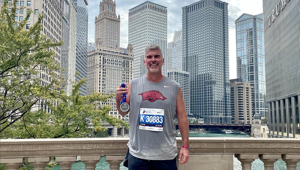
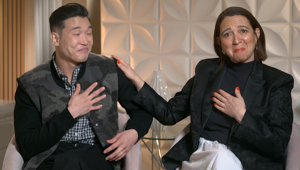







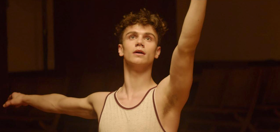

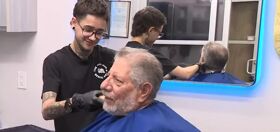

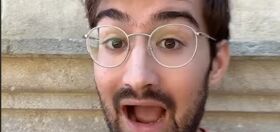

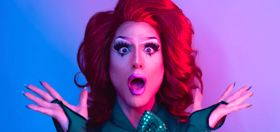
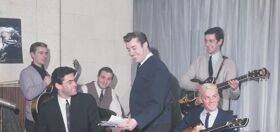
Jared MacBride
Nothing to see here. Perlman’s misdeeds have been well-chronicled for the past decade at least.
DCguy
You could tell in that reality show they did years ago about O-Town that the guy was perving on them showering.
Vince
I don’t forgive Lou Pearlman for giving us Aron Carter.
Jared MacBride
not even the baby jeebuth will forgive him for that.
Larry McD
Lemme just say AMEN and HALLAYLUYAR to Jared McBride’s comment.
ingyaom
“Boy band craze of the early 2000s”?
What about Menudo, New Edition, New Kids on the Block, Boyz II Men, Take That, Boyzone, etc. from the 1970s, 80s and 90s?
tommyboy5023
The Jonas Brothers and One Direction since then. As long as there are young girls and gay men, there will be boy bands.
Brian
Agreed. It’s weird to say that boy bands came from the blimp business. There were boy bands at Motown and before.
Vince
@tommyboy5023. Yep I was just thinking that. Boy bands are practically eternal. Like you said wherever there’s teen girls and gay men you’ll have boy bands. Forever linked.
Also we’re kind of due for another one since one soon since One direction and the Jonas Brothers have broken up.
Chip1218
Lou was my mom’s nextdoor neighbor in Flushing, Queens. His mom Reenie used to babysit me, and hers is the first funeral I remember. Lou was quite the interesting person and even though I was gay and would have loved to meet NSync and BSB I knew I would have been asked to do something uncomfortable in return – either sexual or business related. It just seemed to be how he operated.
OzJosh
Dear sub-editor: it is “say their PIECE”, no “peace”.
Larry McD
Thank you.
myrdraal2001
It is also, “Your mom,” not, “You are mom.”
Brian
Correct. You can say your piece in order to make peace. They’re confusing the two phrases.